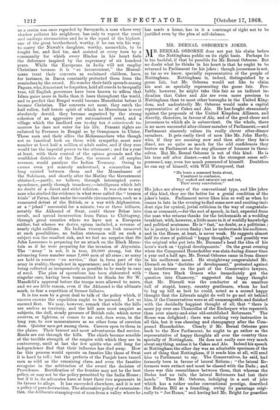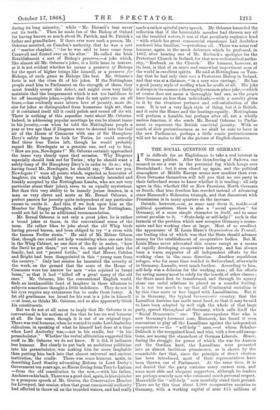MR. BERNAL OSBORNE'S JOKES.
MR. BERNAL OSBORNE does not put his claim before 1. the Nottingham public on its right basis. Perhaps he is too bashful, if that be possible for Mr. Bernal Osborne. But no doubt what he thinks in his heart is that he ought to be returned to Parliament for his jokes ; though jocoseness is not, as far as we know, specially representative of the people of Nottingham. Nottingham is, indeed, distinguished by a goose fair, but Mr. Osborne would not like to claim his seat as specially representing the goose fair. Pro- bably, however, he might take this fair as an indirect in- dication that Cakes and Ale are even more precious to Nottingham than to most other boroughs in the United King- dom, and undoubtedly Mr. Osborne would make a capital representative of Cakes and Ale. He has fought strenuously against the proposals of the United Kingdom Alliance, and directly, therefore, in favour of Ale, and of the good cheer and jocoseness to which ale is subservient. On the whole, there is no more successful after-dinner member of Parliament,—and Parliament sincerely values its really clever after-dinner members. It gets easily tired of men like Mr. John Hardy, who, if they are amusing now and then after they have dined, are so quite as much for the odd confidences they bestow on Parliament as for any glimmer of humour in them- selves. But Mr. Bernal Osborne is not of this kind. He is his true self after dinner,—and in the strongest sense self- possessed, nay, even too much possessed of himself. Doubtless he can say of himself, with Will Waterproof, that
"He bears a seasoned brain about, Unsubject to confusion, Tho' soaked and saturate out and out, Thro' every convolution."
His jokes are always of the conventional type, and like jokes of this kind, they are the better for a genial condition of the joker's brain. Parliament never likes him so well as when he comes in late in the evening to find some new and exciting inci- dent ripe for cynical, jovial criticism in the way of congratula- tion or comment,—for the sort of speech, in fact, expected from the man who returns thanks for the bridesmaids at a wedding breakfast, with, however, a little more in it of worldly knowledge and political acuteness. He is "fast," no doubt, as a politician ; he is jaunty, he is even flashy ; but he understands his audience, and in the House, at least, is never weak. He suggests almost half its store of political "happy thoughts," and possibly was the original who put into Mr. Barnand's head the idea of his hero's work on typical developments.' On the great evening when the Compound Householder was slain during dinner time a year and a half ago, Mr. Bernal Osborne came in from dinner in his mellowest mood. He straightway congratulated Mr. Disraeli on his "doctrine of development," protested against any interference on the part of the Conservative lawyers, "those two Black Graces who immediately got the question into Chancery," suggested the happy thought that Mr. Disraeli was the conductor of an omnibus full of stupid, heavy, country gentlemen, whom he had to lug up hill as best he could, noted as a second happy thought that the Liberals might do well to go and sit behind him, if the Conservatives were at all unmanageable, and finished with the decidedly happiest thought of all, that "there is more joy over one Chancellor of the Exchequer who repenteth than over ninety-and-nine old-established Reformers." The House was delighted ; there was nothing very instructive in all this, but it was cheering and champagney after the Com- pound Householder. Clearly if Mr. Bernal Osborne goes back to the New Parliament, he ought to go rather as the representative of happy thoughts all over the country than specially of Nottingham. He does not really care very much about anything, unless it be Cakes and Ale. Indeed his speech at Nottingham the other day was an admirable specimen of the sort of thing that Nottingham, if it sends him at all, will send him to Parliament to say. The Conservatives, he said, had formerly been in favour of lateral Reform ; "the lateral Re- formers were extinct and must be classed with the Dodo ; and there was this resemblance between them, that whereas the Dodos had no tails, the lateral Reformers had lost their heads." Then Mr. Osborne, indulging in a sort of joke which has a rather undue conventional prestige, described the Reform Bill as a foundling, owing its parentage origi- nally to "Joe Hume," and having had Mr. Bright for guardian during its long minority," while "Mr. Disraeli's brat never cut its teeth." Then he made fun of the Bishop of Oxford for having known so much about St. Patrick, and St. Patrick's father and grandfather. If there ever were such a person, Mr. Osborne asserted, on Camden's authority, that he was a sort of "marine chaplain," "for he was said to have come from Cornwall and floated over on his altar." He called the Irish Establishment a sort of Bishop's preserve,—a joke which, like almost all Mr. Osborne's jokes, is a little loose in texture, as it is not evident whether he means a preserve of Bishops for the sport of higher beings like himself, or a preserve for Bishops, of such game as Bishops like best. Mr. Osborne's forte is not the close fit of his jokes. If the Nottingham people send him to Parliament on the strength of them, they must frankly accept this defect, and might even very fairly maintain that the temperament which is not too fastidious to let off incomplete jokes,—jokes that do not quite run on all fours,—has evidently more inborn love of jocosity, more de- sire for jokes as distinguished from humorous high art, than if it contained itself till it could polish and round off its wit. There is nothing of this superfine taste about Mr. Osborne. Indeed, in addressing popular meetings he can be almost inane in his jocosity,—as when he told the Nottingham people a year or two ago that if Diogenes were to descend into the foul air of the House of Commons with one of Sir Humphrey Davy's safety lamps to look for Tories, he could scarcely find three true Tories left, though he would probably regard Mr. Newdegate as a genuine one, and say to him, "How are you, Newdegate I" Mr. Osborne certainly approached the inane very closely upon that occasion. Why Diogenes especially should look out for Tories ; why he should want a safety-lamp of Sir Humphrey Davy's in order to do so ; why, having found Mr. Newdegate, he should say, "How are you, Newdegate I" were all points which, regarded as fountains of laughter, (in which light they were evidently intended and frankly accepted by the Nottingham Lambs, who are net very particular about their jokes), seem to us equally mysterious. But then this very ability to be inanely jocose denotes, in a man so very clever and acute as Mr. Bernal Osborne, a perfect passion for jocosity quite independent of any particular causes to excite it. And this, if we look upon him as the Member for Happy Thoughts, rather than for Nottingham, could not fail to be an additional recommendation.
Mr. Bernal Osborne is not only a great joker, he is rather a broad joker at times, in the conventional sense of the term. He rather likes to joke about the old Whig birds having proved barren, and been obliged to try "a cross with the famous Peelite strain." He said of Mr. Milner Gibson that, though one could not help wondering when one saw him in the Whig Cabinet, as one does of the fly in amber, "how the Devil he got there," yet even he, once adopted into the family, had not "proved fertile," and that Messrs. Cobden and Bright had been disappointed in this "young man from the country." Only last session he lamented the severity of the work, on the ground that the seats of the House of Commons were too narrow for men "who rejoiced in broad beam," so that it had "killed off a great many of the old ones." Mr. Osborne, like the conventional English world, finds an inexhaustible fund of laughter in these allusions to subjects sometimes thought a little indelicate. They do not in his eyes require any extraneous fun to make them funny. A fat old gentleman too broad for his seat is a joke in himself, —at least, so thinks Mr. Osborne, and so also apparently think his constituents.
But we do not at all mean to imply that Mr. Osborne is so conventional in his notions of fun that he has no real humour at all. He has some, though it is not of an original type. There was real humour, when he wanted to make Lord Amberley ridiculous, in speaking of what he himself had done at a time when Lord Amberley was,—not in his cradle, but "in his
perambulator." Whether the verbal alliteration suggested this scoff to Mr. Osborne we do not know. If it did, it indicates less humour. But clearly to put back an ambitious politician into his perambulator, was making him far more laughable than putting him back into that almost universal and ancient institution, the cradle. There was some humour, again, in describing Lord Stanley advocating Reform in Lord Derby's Government ten years ago, asiEneas fleeing from Troy to Latium —from the old constitution to the new,—with his father, Anchisesonhisback. Therewas a good deal, again, in hisrejoinder to a pompous speech of Mr. Graves, the Conservative Member for Liverpool, last session, when that great commercial authority had affected to throw oil on the troubled waters, and had really
made a rather spiteful party speech. Mr. Osborne hazarded the reflection that if the honourable member had thrown any oil on the troubled waters, it was of that peculiarly explosive kind "with which his great commercial experience had doubtless rendered him familiar,"—petroleuni oil. There was some real humour, again, in the mock deference which he professed, in 1867, after hearing one of Mr. Roebuck's apologies for the Protestant Church in Ireland, for that new ecclesiastical autho- rity, "Roebuck on the Church." His humour, however, at its best, is that of an acute and somewhat impertinent man of the world in excellent spirits. He said at Nottingham on Tues- day that he had only once seen a Protestant Bishop in Ireland, and that was at a distance, "in a very nice carriage." He has a good jaunty style of scoffing when he scoffs at all. His joke is always in its essence a thoroughly common-place joke,—which of course does not mean a thoroughly bad one, as the peopk have humour no less than individuals,—with a novelty given to it by the vivacious pertness and self-satisfaction of the man. It is not a very high style of thing, but it is British, and it suits the House and the hustings equally. Nottingham will perform a humble, but perhaps after all, not a wholly useless function, if she sends Mr. Bernal Osborne to Parlia- ment to represent the British convivial jocosity. With so much of slow pretentiousness as we shall be sure to have in the new Parliament, perhaps a little comic pretentiousness will not be amiss to fill in the picture of English character.



































 Previous page
Previous page